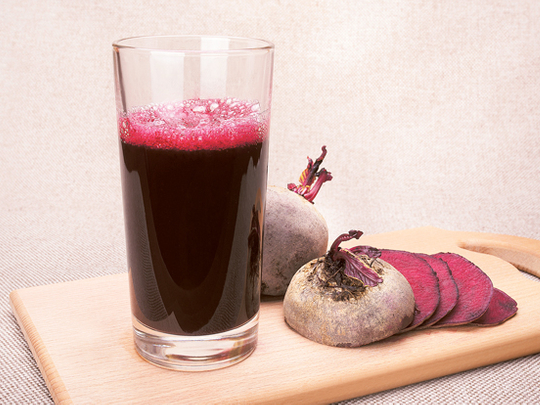
New York: A small yet significant study shows that beetroot juice improves exercise function in chronic obstructive pulmonary disease (COPD) patients.
The new research by Wake Forest University looked at a small group of COPD patients who drank beetroot juice as compared to a placebo drink before exercise.
“The intent of this study was to determine if acute ingestion of beetroot juice, which is rich with nitrates, before exercising could improve the exercise capacity of COPD patients,” said Michael Berry, chair of Wake Forest’s department of health and exercise science.
COPD makes it difficult for patients to breathe and worsens over time.
In turn, they tend to limit their activities, become more sedentary, and lose fitness and physical function.
The findings showed overall that those patients who drank beetroot juice were able to extend their exercise time and had reduced exercise diastolic and resting systolic blood pressures.
“This is the first study to demonstrate beneficial effects of dietary nitrite supplementation on exercise performance and blood pressure in patients with COPD,” he added. One of the benefits of exercise is that if you get positive results, you are more likely to continue doing it.
“If beetroot juice positively impacts those results, it could motivate COPD patients to continue to be physically active and improve their health,” he added.
But the studies also back up a growing trend among athletes who rely on the juice.
For the past few years, top endurance athletes have been guzzling beet juice before their races to load up on nitrate, which helps muscles use oxygen more efficiently. We usually think of nitrate as a nutritional villain in foods like hot dogs and bacon, but a growing body of research suggests that it actually plays a crucial role in cardiovascular health, and may even explain the long-standing mystery of why leafy green vegetables are so good for us — as long as you don’t use too much mouthwash.
One recent study, published in the journal Hypertension, showed that simply drinking a cup of nitrate-rich beet juice lowered high blood pressure by more than 10 mmHg within a few hours, with effects persisting a day later. In comparison, severely restricting your salt intake will reduce your blood pressure by about 5 mmHg on average.
The beneficial effects are actually produced by nitric oxide, which has well-known cardiovascular benefits; it was only in 2008 that researchers realised that humans could convert nitrate from food into nitric oxide in significant quantities. The key: friendly bacteria that live in the mouth, which convert nitrate in saliva to nitrite, a related ion with one fewer oxygen atom that is then converted elsewhere in the body to nitric oxide.
“Nitric oxide does many good things,” explains Dr. Amrita Ahluwalia of the William Harvey Research Institute in London, the lead author of the new study. “It opens up your blood vessels to lower blood pressure; it stops platelets from being sticky; and it prevents the blockages that lead to stroke and heart attack from forming.”
Several studies from groups in Sweden and Britain have now established the acute effect of nitrate on blood pressure, and longer trials are now under way to see whether the benefits persist with a chronic high-nitrate diet — an idea that would have sounded foolish even just a few years ago, given long-standing concerns about the links between nitrate in cured meats and cancer.
Nitrate and nitrite are added to cured meats as a preservative; it’s thought that at high heat they can combine with another group of chemicals found in cured meats, amines, to produce carcinogenic nitrosamines.
“This fear emerged in the 1960s and 70s, but it hasn’t been substantiated in later studies,” notes Dr. Eddie Weitzberg, a medical researcher at the Karolinska Institutet in Sweden who has conducted some of the key studies on dietary nitrate.
Either way, that potential risk doesn’t apply to the nitrate found in vegetables, which don’t contain amines. Leafy green vegetables like spinach and beet greens, in particular, naturally have so much nitrate that you could easily exceed the outdated recommended maximum for nitrate simply by following nutrition guidelines on vegetable intake, Weitzberg says.
There is one potential barrier to the effectiveness of a nitrate-rich diet: mouthwash. Rinsing with a mouthwash containing a powerful antibacterial agent like chlorhexidine wipes out the bacteria that convert nitrate to nitrite for 24 to 48 hours. Other mouthwashes don’t have quite as dramatic an effect — “One might say it’s lucky that products like Listerine are not so potent,” Weitzberg says — but it’s still unclear whether using mouthwash on a regular basis might interfere with the nitrate benefits of eating vegetables.












